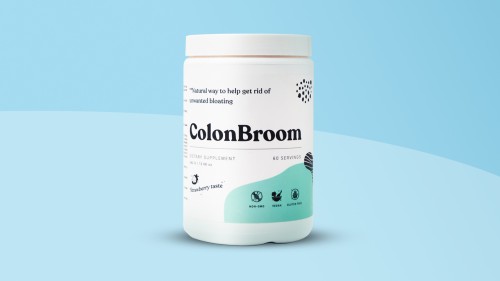WellnessVerge is reader-supported. We may earn a commission when you make a purchase through the links on this page. Learn more about our process here.
UMZU zuPOO Review: Are Its Claims True? A Dietitian Explains
Last Updated on April 28, 2021
Medically Reviewed by Anthony Dugarte, MD
ZuPoo is marketed as a colon cleanse and gut support supplement that claims to remove toxic waste from the body and improve digestion. Some of the ingredients in ZuPoo act as laxatives and will certainly increase trips to the bathroom, but in my opinion, there is no real benefit.


|
Pros
|
Cons
|
What Is ZuPoo?
Everything you need to know about ZuPoo you can learn from its tagline: “make America poop again.”
This supplement is designed to eliminate waste, in the form of feces, from the body.
It’s marketed as a 2-week colon cleanse and claims to help remove “toxic waste,” improve digestion and result in 5–20 pounds of weight loss.
It’s made by a company called UMZU which sells supplements targeted to support hormonal health.
The website states the product contains a blend of vitamins, minerals, herbs, and barks. You won’t find any vitamins or minerals on the ingredient list of this product.
It’s made from herbs, spices, and other plant ingredients, some of which have known laxative properties.
Why would someone want to spend two weeks flushing out their colon? My guess is to feel lighter, leaner, and less bloated.
But make no mistake: this is not a safe, sustainable, or healthy way to lose weight.
If you do not have regular bowel movements, the answer is not a colon cleanse. Occasional mild constipation happens, but it shouldn’t be a way of life.
Lifestyle factors impact how often you go and the quantity and consistency of the waste your body excretes.
Although the colon cleanse industry would like you to believe that your intestines are full of rotting waste that releases toxins that can make you sick, science does not back up this theory.
When fed a nutritious diet that includes plenty of water and fiber, the digestive tract should be able to “cleanse” itself just fine.
Evaluation of Ingredients
ZuPoo contains 1,270 milligrams per serving of “ZuPoo Formula.”
Interestingly, UMZU also claims they have a “culture of transparency” and that each of their supplements lists the exact dosage of each ingredient. The amount of each ingredient in ZuPoo is not listed.
Below are the ingredients in the formula:
Cascara Sagrada
Cascara Sagrada is the proper name for buckthorn, which is a species of shrubs and trees. It comes from the bark of the plant and has laxative properties.
It contains anthraquinones, which work by stimulating the intestines and colon, causing muscle contractions that result in the movement of waste. (1)
Anthraquinones also block the reabsorption of water and electrolytes in the colon, which is a normal part of digestion and can lead to diarrhea, dehydration, and electrolyte imbalance.
Senna Leaf Powder
Senna is a common herbal ingredient found in “natural” laxatives. It also contains anthraquinones, which stimulate the contraction of the colon. (2)
Fennel Seed Powder
Fennel seeds are historically believed to aid digestion and relieve gas and bloating, although there isn’t clinical evidence to support this.
Whole fennel seeds are also a good source of fiber, which can support healthy digestion. I’m not sure how this fennel seed powder is produced and if it has the same properties. (3)
Burdock Root Powder
Another plant ingredient, burdock, is used as a vegetable and herbal medicine in Asian cultures. It has a history of use as a diuretic and digestive aid in traditional medicine. (4)
Clinical studies have focused on its anti-inflammatory effects and use in inflammatory skin conditions like acne. There is little documented on benefits for the digestive system.
Bentonite Clay
Many colon cleanse supplements are formulated with clay, which they claim absorbs and removes waste toxins from the intestines, but there are no studies involving humans to support this theory.
Clay contains some minerals, like calcium and magnesium, but a healthy and varied diet easily meets most individuals’ micronutrient needs. (5)
Buckthorn Bark Powder
I couldn’t find much research about this ingredient. I am assuming it’s essentially the same as cascara sagrada, which also comes from the bark of the buckthorn plant.
Cape Aloe Leaf Extract (Aloe Ferox)
Aloe is believed to soothe digestive upset, heartburn, and other stomach-related issues.
Some studies have found aloe vera juice or gel is beneficial for reducing symptoms of irritable bowel syndrome.
The aloe component in ZuPoo, aloe ferox, is not the same as aloe vera. However, aloe ferox contains anthraquinones and is a strong laxative. (6)
Slippery Elm Extract
Slippery elm comes from the bark of a plant and is used in Ayurvedic medicine to treat digestive problems.
It’s believed to protect and soothe the lining of the stomach and intestines from inflammation and irritation. (7)
One study found individuals who supplemented with a formula containing slippery elm experienced less indigestion, stomach pain, gas, constipation, and diarrhea. (8)
However, the study was small and slippery elm was only one of several ingredients in the supplement.
Milk Thistle
Milk thistle is an herb that supports liver health. Studies have found milk thistle has liver-protective qualities that can prevent acute liver injury caused by some medications and supplements. (9)
Cayenne Pepper Extract
Cayenne pepper has several beneficial effects on digestion, including protecting the lining of the stomach and reducing symptoms of indigestion and irritable bowel like bloating and stomach pain. (10)
Support for Claimed Benefits
Below is our summary of the available evidence for the claimed benefits of UMZU zuPOO based on the available research:
| Eliminate waste | 4/5 |
| Improve digestion | 2/5 |
| Weight loss | 2/5 |
Side Effects, Safety, and Dosage
One dose of ZuPoo is two capsules. The directions recommend taking each dose before bed for 15 consecutive days.
The instructions indicate most people will experience gas in the 12–24 hours following the first dose, plus a large bowel movement in the first 12–48 hours.
Since stimulant laxatives can cause diarrhea, I wouldn’t recommend using this product regularly. (11)
Besides being inconvenient and disruptive, excessive trips to the bathroom can also result in intestinal cramping, nausea, dizziness, and weakness.
It’s recommended that stimulant laxatives not be used for more than a few weeks at a time. (12)
Long-term use is associated with misuse and dependency. Misuse of stimulant laxatives can lead to dehydration and electrolyte imbalance. (13, 14)
Several ingredients in ZuPoo have some concerning side effects.
Long-term use of cascara sagrada is associated with liver injury. It was used in many over-the-counter laxatives until 2002 when the Food and Drug Administration (FDA) ruled the ingredient is not generally recognized as safe or effective. (15, 16)
Although senna is generally recognized as safe, it’s recommended for short-term use only. High dosages and long-term use are associated with diarrhea, abdominal cramping, and liver injury. (2)
This product should not be used by anyone with a serious digestive condition, such as irritable bowel syndrome, diverticulitis, or Crohn’s disease.
It should also be avoided by pregnant and nursing women since most of the herbal ingredients have not been extensively studied for safety.
This product should not be used by individuals with a history of disordered eating or yo-yo dieting since it’s an unhealthy and unsustainable method of weight loss.
There are no third-party testing seals on the product to ensure the purity of ingredients.
Speak with your primary healthcare professional before starting ZuPoo or any other laxative supplement.
Cost and Where to Buy
A bottle of ZuPoo Colon Cleanse contains 30 capsules – a 15-day supply. It costs $29.95. The product can only be purchased from the UMZU website.
The price is discounted to $25.46 per bottle if you sign up to auto-ship every 30, 60, or 90 days.
I don’t recommend taking this product that frequently, but the option is there if you want to save a few dollars.
UMZU offers a 60-day money-back guarantee on the first purchase of all their products.
How It Compares
This product seems overpriced compared to old-fashioned drug-store laxatives, which typically cost less than $10.
Of course, those are intended for occasional use to treat constipation and are not marketed as a two-week natural cleanse.
I found a variety of similar herbal colon cleanse supplements that also follow the two-week formula and contain a blend of herbal ingredients like senna, cascara sagrada, licorice root, MCT oil, probiotics, psyllium husk powder, flaxseed powder, and aloe vera gel.
Similar herbal colon cleanse supplements are priced under $15 for a 2-week supply, which definitely makes ZuPoo overpriced by comparison.
The Bottom Line
ZuPoo Colon Cleanse is an overpriced laxative that perpetuates the diet culture.
The product contains a blend of plant ingredients that have been used in traditional and folk medicine but haven’t been well studied in humans.
Cascara sagrada, senna leaf, and aloe ferox act as laxatives in the body and will certainly increase trips to the bathroom when taken for two weeks as directed.
Weight loss may occur due to increased waste excretion, but this weight will be regained when normal eating and digestion resume.
A Word from Our RD
I don’t recommend cleansing, detoxing, or quick fixes for weight loss, as they’re unsustainable with questionable safety.
If you’re unsure whether your bowel movements are normal, speak with a healthcare provider or dietitian.
It might seem awkward, but paying attention to how often you go and the color, consistency, and size of your excretions can help a healthcare professional pinpoint how to improve your digestive health.
If you’re experiencing mild to moderate constipation, I recommend trying a probiotic supplement or eating more fermented foods like yogurt, drinking more water, and upping your fiber content by eating more fruit, vegetables, legumes, and whole grains like oats.
Physical activity can also help relieve constipation and keep you regular.
At WellnessVerge, we only use reputable sources, including peer-reviewed medical journals and well-respected academic institutions.
- LiverTox: Clinical and Research Information on Drug-Induced Liver Injury: Cascara:
https://www.ncbi.nlm.nih.gov/books/NBK548113/ - LiverTox: Clinical and Research Information on Drug-Induced Liver Injury: Senna:
https://www.ncbi.nlm.nih.gov/books/NBK547922/ - Spices, fennel seed:
https://fdc.nal.usda.gov/fdc-app.html#/food-details/171323/nutrients - Overview of the anti-inflammatory effects, pharmacokinetic properties and clinical efficacies of arctigenin and arctiin from Arctium lappa L:
https://www.ncbi.nlm.nih.gov/pmc/articles/PMC5943914/ - Bentonite Clays for Therapeutic Purposes and Biomaterial Design:
https://pubmed.ncbi.nlm.nih.gov/32013819/ - Aloe Genus Plants: From Farm to Food Applications and Phytopharmacotherapy:
https://www.ncbi.nlm.nih.gov/pmc/articles/PMC6163315/ - Prebiotic Potential of Herbal Medicines Used in Digestive Health and Disease:
https://www.ncbi.nlm.nih.gov/pmc/articles/PMC6065514/ - Herbal formula improves upper and lower gastrointestinal symptoms and gut health in Australian adults with digestive disorders:
https://pubmed.ncbi.nlm.nih.gov/32151878/ - LiverTox: Clinical and Research Information on Drug-Induced Liver Injury: Milk Thistle:
https://www.ncbi.nlm.nih.gov/books/NBK548817/ - Harnessing the Therapeutic Potential of Capsaicin and Its Analogues in Pain and Other Diseases:
https://www.ncbi.nlm.nih.gov/pmc/articles/PMC6272969/ - Systematic review of stimulant and nonstimulant laxatives for the treatment of functional constipation:
https://www.ncbi.nlm.nih.gov/pmc/articles/PMC4234355/ - Long term treatment with stimulant laxatives - clinical evidence for effectiveness and safety?:
https://pubmed.ncbi.nlm.nih.gov/30700194/ - Laxatives:
https://www.ncbi.nlm.nih.gov/books/NBK537246/ - Laxative abuse: epidemiology, diagnosis and management:
https://pubmed.ncbi.nlm.nih.gov/20687617/ - Cascara sagrada-induced intrahepatic cholestasis causing portal hypertension: case report and review of herbal hepatotoxicity:
https://pubmed.ncbi.nlm.nih.gov/11151906/ - Status of certain additional over-the-counter drug category II and III active ingredients. Final rule:
https://pubmed.ncbi.nlm.nih.gov/12001972/






